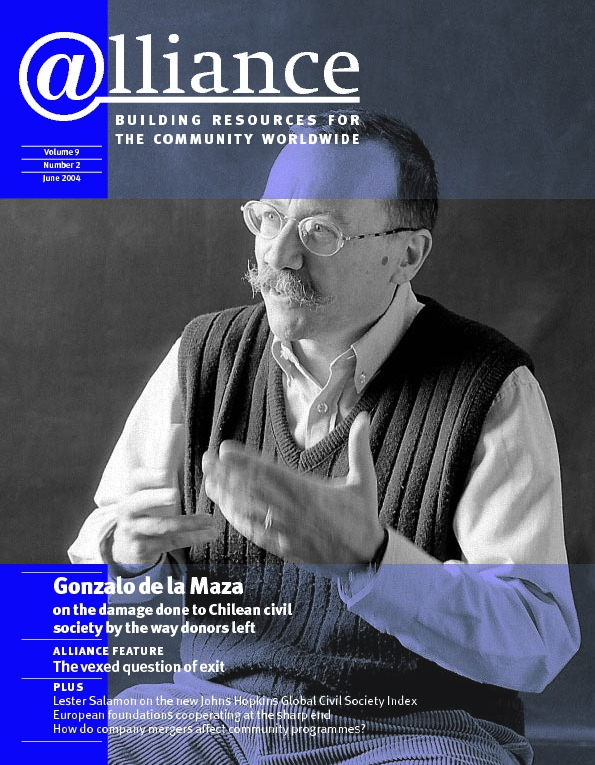Sooner or later, most relationships within the system of international aid face the prospect of separation. In grantor-grantee relationships particularly, because of deeply rooted and substantial power asymmetries, the impact of separation is often uneven and inequitable. But power asymmetries should not mean arbitrariness and unfairness.
Unfortunately, there are almost no means of redress for a grantee when there is disagreement about exit reasons or strategies.[1] This article argues that a neutral facilitator could help minimize the negative consequences of power asymmetries in many aspects of aid relationships, including exit.
Some eight years ago an idea emerged to establish an Ombudsman as an independent and respected resource that could help mediate and adjudicate when relationships between NGOs became stressed.[2] At that time, the focus was on North-South NGO relations and the difficulty of reconciling separation with the much-espoused framework of NGO ‘partnership’, with its implied mutuality and adherence to rules of fair play. Possibly naively, the proponents of the idea thought that northern NGOs would wish to reduce the charge of being judge, jury and executioner in relation to exit. The idea did not mature, perhaps because of anxieties about ceding complete control and opening up relationships to independent scrutiny.
It is eight years since the concept first emerged, and there seems to be more need than ever for independent actors to bring greater equity to development relationships. Although the idea grew out of concerns about partnerships among NGOs, it can usefully be applied to relationships involving a far wider range of players, including international agencies, governments, companies and community-based organizations.
Yet with the benefit of reflection we now suggest that prevention rather than cure should be the focus. The concept of ‘cure’ tended to focus on adjudication of differences and immediate justice. ‘Prevention’ looks more to encouraging healthy partnerships through greater equity in the formation, ongoing processes that prevent miscommunication and distrust, and equitable terminations (however they come about).
The success of neutral facilitation in many contexts and cultures is well documented, especially where diverse, and sometime competing, interests are present. It could play an important role in development relationships too, for several reasons – the first being the ubiquity of the partnership relationship. Indeed, partnership is often proposed as a means to better align governments, businesses and civil society towards development ends. Given the differences involved within and between these types of institution, a trusted and neutral ‘fourth party’ could help bring the different actors together to negotiate, learn, and grow to respect each other. Increasing demands for transparency and accountability, which cannot be satisfied by continuing negotiations behind closed doors and power relations that permit unequal disclosure, are another factor. Somehow, the trust must be built that is needed for information to be willingly shared rather than painfully extracted.[3]
If the process is to be effective and available, the cost must be kept low enough to encourage use but high enough to ensure facilitation is professional. The cost generally falls into two categories. First, there is the development of general processes and guidelines. Northern or southern NGOs may choose to develop these[4] so that smaller NGOs and programmes can simply ‘adopt’ protocols into their operating documents and agreements. Then there are the costs of facilitation for specific programmes or relationships. These may come from programme funds, NGO support organizations via membership fees or otherwise, or separate donor funding.
Neutral facilitation could not only improve ongoing operational relationships but address the key issue of how the parties will ‘say goodbye’. It could help all parties talk about and reach a shared perspective on exit at the beginning of a relationship rather than searching for an understanding under the pressure of an impending termination. This preventive measure could reduce the friction and enhance the equity of separation. It could freshen up the soured atmosphere that seems to pervade the international development world, with its frequent broken promises and the power differences that allow them to go unchecked and unaccounted for. Partnership facilitation could help restore the credibility, moral foundation and public trust that have been seriously eroded.
Two examples
1 INGO and local NGO determine to form a partnership for a multi-year programme. Informal discussions among the facilitator and NGO representatives may result in a facilitated process to identify common interests, appropriate terms of engagement, dispute processes and termination strategies that recognize and address the asymmetries in power and resources.
2 NGOs in an existing but underperforming partnership seek the help of neutral facilitation to assess the core reasons for conflict and establish a process to bring about better understanding, or alternatively to revise the terms of engagement or help terminate their relationship with equity and reduced conflict.
Alan Fowler is an independent adviser, analyst and author on development. He can be contacted at alanfowler@compuserve.com PHOTO ON Alan Fowler Portrait.jpg
Joe McMahon is a facilitator and mediator working in conflict resolution and development. He can be contacted at jpmcmahon@jpmcmahon.com
1 Grant agreements typically specify the grantor country and laws as the basis for settling disputes. This is seldom a practical path for grantees.
2 Alan Fowler (Co-Founder, INTRAC and Development Consultant, Manila) and Kamal Malhotra (Co-Director, FOCUS, Bangkok) (June 1997) An NGO Ombudsman: A new way of enhancing development alliances in a fast globalizing world (mimeo).
3 For those interested in discussing such an initiative, please contact the authors. The concepts involved are explained in greater detail at http://www.inter-mediation.org
4 This documentation and process may include facilitation training guides, form agreements for the use of neutral facilitation, guidelines for appropriate use, and ethical rules for facilitators, and draft processes that may all be tailored to local needs.





Comments (0)